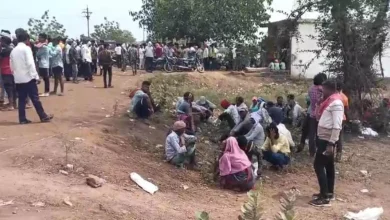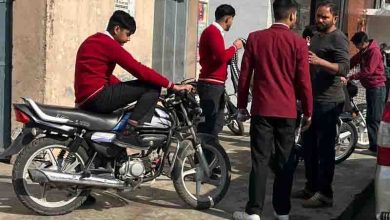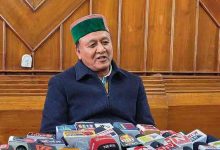
New Delhi: Amid indications that the upcoming Winter Session of Parliament, beginning on December 4, will be a stormy affair, the government on Saturday asserted that it is ready for a discussion on all issues, provided the Opposition ensures an enabling environment in the House. The government convened an all-party meeting, chaired by defence minister Rajnath Singh, where the Opposition camp listed out the issues it wants to be taken up during the session. Issues like the Israel-Palestine conflict, Manipur situation, unemployment, price rise, “imposition” of Hindi in the new criminal laws and “misuse” of probe agencies are top on the Opposition’s agenda.
For the Winter Session, the government has listed 19 bills, including two to extend provisions of the Women’s Reservation Act to Jammu and Kashmir and Puducherry, three to replace the criminal laws and two financial items. It called for discussions to be held “following the rules and procedures” of the Houses.
Commencing a day after the results of the Assembly elections in four states — Madhya Pradesh, Rajasthan, Chhattisgarh and Telangana — will be declared, the first few days could also see the impact of the election results in both Houses.
While the TMC wants a discussion on the issue before any action is taken on the panel’s report, a letter to the Speaker Om Birla by Congress Lok Sabha leader Adhir Ranjan Chowdhury in his “personal capacity” said Ms Moitra’s expulsion from Parliament is an “extremely serious punishment and has very wide ramifications”.
In his four-page letter to the Speaker, Mr Chowdhury demanded a relook at the rules and processes of parliamentary committees, asserting that there is no clear demarcation in the roles envisaged for the privileges committee and the ethics committee, especially on exercising penal powers.
“If the media reports on the recommendations of the ethics committee on choosing to recommend expelling Ms Moitra from Parliament are right, it would perhaps be the first such recommendation of the ethics committee of Lok Sabha,” Mr Chowdhury said in his letter to the Speaker.
After the meeting, parliamentary affairs minister Pralhad Joshi said the government assured during the all-party meeting that it is ready for discussion on all issues. He, however, said the Opposition must ensure an enabling environment for discussion to take place.
Mr Joshi said the government is fully ready for a structured debate and has requested the Opposition to let the House function smoothly. He added that the government has taken the Opposition’s suggestions positively.
Deputy Leader of the Opposition in the Rajya Sabha Pramod Tiwari said the Opposition has flagged concerns over the issues of China “taking away” our land, Manipur, price rise and “misuse” of the Enforcement Directorate and the Central Bureau of Investigation.
Those who attended the meeting also included commerce minister Piyush Goyal, law minister Arjun Ram Meghwal, Congress leaders Jairam Ramesh, Gaurav Gogoi, and Pramod Tiwari, TMC member Sudip Bandyopadhyay, NCP member Fouzia Khan and RSP member N.K. Premachandran among others.
The Winter Session of Parliament from December 4 to December 22 will have 15 sittings.
Ahead of the commencement of the Winter Session, TMC representatives during the all-party meeting claimed that the panel’s report on Ms Moitra had been made public “brazenly” before being tabled in the House.
TMC parliamentary party leaders of Lok Sabha and Rajya Sabha, respectively — Mr Bandyopadhyay and Derek O’Brien — sources revealed, said while a few MPs are already under suspension, they have seen reports in the media that one member of the TMC is “going to be expelled shortly”.
In the meeting, both TMC members also accused the government of reducing all-party meetings to a “waste of time”. The government is bringing bills to Parliament without discussing them in all-party meetings, they alleged, according to the sources.
They also urged the government not to pass the three bills to replace the IPC, CrPC and Evidence Act. The TMC leaders also raised the issue of pending MGNREGA payments for West Bengal and alleged that the federal structure is under threat. They also sought discussion on issues like unemployment and price rise.
The RSP member said most members raised objections against imposing Hindi in the criminal laws by giving new nomenclature to the Indian Penal Code, Criminal Procedure Code, as well as the Indian Evidence Act.
“It is even very difficult to pronounce as far as the people belonging to the southern states are concerned…the government has not responded…,” said the leader after the meeting.
Jharkhand Mukti Morcha leader Mahua Maji demanded that smaller parties be given more time to raise issues in the House.
On the separate bills to introduce the women reservation in Jammu and Kashmir and Puducherry, the two Union territories, Union law minister Arjun Ram Meghwal explained that there is no provision yet to extend the provisions of the law in the UTs.
The government has listed the Government of Union Territories (Amendment) Bill, 2023, for introduction, consideration and passage in the session beginning Monday. It seeks to insert provisions for providing reservations to women in the Puducherry Legislative Assembly.
Similarly, the Jammu and Kashmir Reorganisation (Amendment) Bill, 2023, seeks to reserve for women a third of the total number of seats in the Legislative Assembly of Jammu and Kashmir.
While there is a provision for a Legislative Assembly in Jammu and Kashmir, the Union Territory is under President’s Rule at present.
Officially known as the Constitution (106th Amendment) Act, the women’s reservation law seeks to provide 33 per cent reservation to women in the Lok Sabha and state assemblies.
According to its provision, “It shall come into force on such date as the central government may, by notification in the Official Gazette, appoint.”
During a Special Session of Parliament in September, Prime Minister Narendra Modi had described the law as “Nari Shakti Vandan Adhiniyam”.
The Constitution amendment bill was passed by the Lok Sabha with near unanimity and the Rajya Sabha with unanimity.
The law will take some time before being implemented, as the next census and the subsequent delimitation exercise — redrawing of the Lok Sabha and the Assembly constituencies — will ascertain the particular seats being earmarked for women.
















